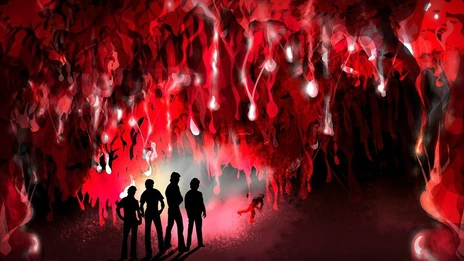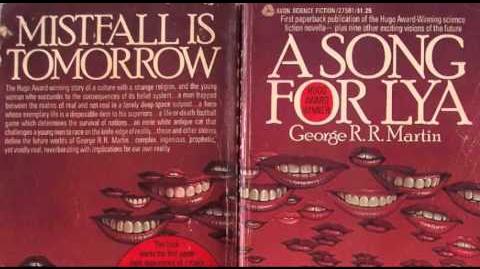A Song for Lya is a science-fiction novella by George R. R. Martin, first published in the June 1974 issue of Analog Science Fiction and Fact. It takes place in the "Thousand Worlds" universe, and is set on the Fyndii Space planet of Shkea during the post-Interregnum period. It is about two Talents who visit an alien planet to find out why the inhabitants worship a mold-like parasitic organism and ultimately choose to be consumed by it.
Plot Summary
— WARNING: THIS SECTION CONTAINS SPOILERS —
Robb is an empath, able to read people’s feelings, and his lover Lyanna is a telepath, with the ability to read thoughts. Lyanna is a major Talent and her abilities are stronger than Robb’s, but also more demanding. The couple is hired for a job on the distant planet of Shkea.
One of the oldest civilisations in space, the culture of Shkea is more than fourteen thousand years old. Yet their inhabitants, the humanoid Shkeen, seem perpetually stuck in Bronze Age. The relationship between humans and Shkeen is recent, with the human settlement in Shkea being less than a decade old, but problems are already starting to arise. The Shkeen worship a blob-like parasite called the greeshka. Before they turn forty, each Shkeen citizen willingly let themselves be slowly eaten by the greeshka, a process called Joining. Before they turn fifty, the process reaches its end, the Final Union, with said Shkeen being completely absorbed. This does not initially concern humans, until dozens of humans start joining the Cult of the Union. Robb and Lya have been asked to investigate this problem, using their Talents to understand what’s going on with these people.
With the help of the planetary administrator Dino Valcarenghi, his aide Nelson Gourlay, and the extee anthropologist Laurie Blackburn, with whom Dino has a romantic relationship, Robb and Lyanna begin to understand the Shkeen culture. For an alien race, the Shkeen are remarkably similar to humans, as Robb notices when he starts reading the Shkeen’s feelings. Their emotions seem to him less sophisticated and more primitive than humans, but understandable and real. More importantly, their thoughts suggest no suicidal tendencies or anything abnormal about the species, despite having a 100% suicide rate.
Robb and Lyanna begin to understand the appeal of the Union when they meet their first Joined Shkeen. The greeshka is a mindless parasite, lacking the slightest spark of a conscience, but they’re the medium that connects the Joined. Those Joined are still themselves, but sharing each other’s minds and feelings. And they’re happy. The repeated contact with the minds of the Joined, particularly after they finally meet the human Joined Gustaffson and Kamenz, causes Lyanna to question everything she thinks she knows about love and connection. Robb and Lyanna believe they can find more answers if they visit the Caves of the Union, home of the main blob of greeshka and where the Final Union takes place. On the night before, however, Lyanna disappears.
Persuaded by Dino Valcarenghi, Robb visits the caves without her. When he meets the main greeshka and tries to read its feelings, he begins to understand what the more Talented Lyanna was sensing. Feeling one with the universe, Robb almost delivers himself to the greeshka, but is stopped by Valcarenghi. He wakes up a few hours later, with Lyanna still missing.
At night, Robb dreams he’s alone on a darkling plain and Lyanna comes to him. She says she could no longer stay in that place, forever alone, with only a touch and a voice to keep her going. The Union called her, every night she could feel the same mindstorm that Robb felt in the cave. She has joined the Union, and she wants Robb to experience the happiness she feels. But Robb refuses.
When he wakes up, he knows this wasn’t just a dream. And he knows he has to leave Shkea as soon as possible, otherwise he may not resist the temptation to follow Lya. Before he leaves, he tells Valcarenghi what he learned. Robb wonders why he didn’t follow Lya, and if could feel what she felt. Laurie Blackburn is also going back home, in the same ship as Robb. She and Robb spend the night together, both heartbroken but still human.[1]
— END OF SPOILERS —
Themes

Artwork by caffeine2, from DeviantArt
At first glance, A Song for Lya seems to contain a nihilistic message, in that it suggests human beings are fundamentally alone in the universe, and that even seemingly deep connections between people are shallow, superficial and fleeting. This loneliness is symbolised by a vision that Robb has of a dark, empty realm called the "darkling plain." But while Lya is willingly devoured by a parasite in the hope of discovering a deeper connection and escaping the darkling plan, Robb decides to keep on living. The ending is melancholy, but it also carries a tone of resilience and perseverance. Robb acknowledges the suffering and loneliness of existence, but decides to face it anyway, in the hope that connection and meaning can still be found in life.
According to Priscilla Zorzi from The Fandomentals, the story depicts loneliness and existential dread as an essential part of human nature. It poses questions about whether "we can find each other, reach each other? And if so, how much and for how long? Do we ever really know each other? Would we love each other if we knew all there is to know, about ourselves and the other?" The shkeen offer the ultimate love, with the promise of wholeness, togetherness, and never being alone again. Yet that level of knowledge may take away something that makes humans human. We are incomplete creatures, A Song for Lya poses, each of us flawed in our own particular way. And "because we’re flawed, because we’re missing something, we develop our dreams, our desires, our goals. We act, we create, we create connections, to people, to things, to places."
A Song for Lya celebrates "the connections we do manage to forge, the small moments we feel we’re not alone, and our capacity for love even among loss and fear and the eternal prospect of the darkling plain that awaits in our dreams, and beyond our stars, and beyond our lives." Zorzi writes that: "it’s not just people we have the potential to connect with: we can find comfort in art, in our pets, in nature, in places… even in stories."[2]
Author's Notes
Martin wrote A Song for Lya in 1973, when he was living in Chicago and working at the Cook County Legal Assistance Foundation. At the time it was the longest story he'd written, and he believed he had finally surpassed his previous favourite stories With Morning Comes Mistfall and The Second Kind of Lonliness.
Martin states that he wrote A Song for Lya in the midst of his first serious romance with a woman, and that this relationship gave the story its emotional core.[3]
Publication History
A Song for Lya was first published in the June 1974 issue of Analog Science Fiction and Fact.
It was included in the Martin's short story collections A Song for Lya and Other Stories, published in 1976, and Nightflyers and Other Stories, published in 1985.
It was later included in his 2003 anthology Dreamsongs: A RRetrospective.
Adaptations
In 2007, Martin's short story anthology Dreamsongs was released in audiobook format. It included a recording of A Song for Lya read by Mark Bramhall.
Reception
A Song for Lya won the Hugo Award for Best Novella in 1975. It was also nominated for the Nebula Award for Best Novella and Jupiter Award for Best Novella, and took second place in the Locus Poll.
In 2014, the Vassals of Kingsgrave podcast released a review of A Song for Lya:

"A Song for Lya" by George R. R. Martin (Review)
Connections to the "Thousand Worlds" Universe
When comparing the thoughts of the Shkeen to other alien species, Robb mentions the Hrangans, the Fyndii and the Damoosh.
Robb refers several times to the planet of Baldur, which is where Simon Kress from Sandkings lives, and where Dirk t'Larien from Dying of the Light and John Bowen from This Tower of Ashes were born. He compares the Tower of Schkeen to the "gaunt skyscrapers" of Baldur and Old Earth. The restaurant he and Lya dine is described as having Baldurian decor and cooking, and they are served a bottle of chilled Baldurian wine call Veltaar. At the end of the story, Robb intends to book passage to Baldur, to return to his and Lya's house.
Allusions to Other GRRM Works
Several of Martin's other works feature the word "song" in the title, most notably his epic fantasy series A Song of Ice and Fire, but also the short story collections Songs of Stars and Shadows, Songs the Dead Men Sing, and Dreamsongs, as well as the co-authored anthologies Songs of the Dying Earth and Songs of Love and Death.
Martin would re-use the names of the two main characters in A Song for Lya for his later book series A Song of Ice and Fire. The names Robb and Lyanna are used for two members of House Stark, Robb Stark being the son of Eddard Stark and Lyanna Stark being Eddard's younger sister, as well for the character of the young Lyanna Mormont.
Additionally, the afterlife and collective consciousness within the Greeshka parallels the afterlife and collective consciousness of the Weirwood trees, as described by the Children of the Forest in A Song of Ice and Fire.
It has been noted by readers that the description of the "darkling plain" in A Song for Lya is very evokative of the description of Corlos in Only Kids are Afraid of the Dark.
“I was back on the plain again, the infinite darkling plain with its starless sky and black shapes in the distance, the plain Lya had spoken of so often. It was from one of her favorite poems. I was alone, forever alone, and I knew it. That was the nature of things. I was the only reality in the universe, and I was cold and hungry and frightened, and the shapes were moving toward me, inhuman and inexorable.” -A Song for Lya
“Darkness. Everywhere there was darkness. Grim, foreboding, omnipresent; it hung over the plain like a great stifling mantle. No moonlight sifted down; no stars shone from above; only night, sinister and eternal, and the swirling, choking gray mists that shifted and stirred with every movement. Something screeched in the distance, but its form could not be seen. The mists and the shadows cloaked all.” -Only Kids are Afraid of the Dark
This parallel may suggest that Corlos and the Darkling Plain are the same place, and occupy a different dimension or a different plane of existence than the one occupied by the characters of the "Thousand Worlds." [4]
Allusions to Other Media
The concept of the "darkling plain" comes from the 1867 poem "Dover Beach" by Matthew Arnold. Lya claims it is one of her favourite poems.
References
- ↑ The Fandomentals https://www.thefandomentals.com/a-song-for-lya/
- ↑ The Fandomentals https://www.thefandomentals.com/a-song-for-lya/
- ↑ Martin, George R. R., Dreamsongs: A RRetrospective
- ↑ The Fandomentals https://www.thefandomentals.com/only-kids-are-afraid-of-the-dark/